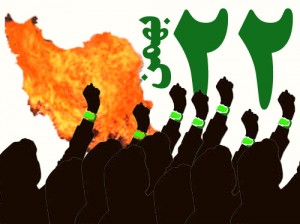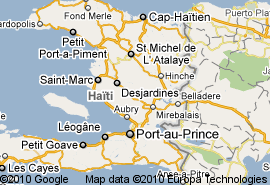
2355 GMT: Just checking in to say we
have posted a video of a Tehran University academic defending Thursday's executions of Mohammad Reza Ali Zamani and Arash Rahmanipour.
1910 GMT: We're taking an evening break. We may be back for a late-night wrap-up. If not, all the latest news will open our Sunday updates.
NEW Latest Iran Video: Defending the Executions (30 January)
NEW Iran Document: Mousavi-Karroubi Declaration on Rights and 22 Bahman (30 January)
NEW Iran Patriotism Special: Wiping the Green From The Flag
The Latest from Iran (29 January): Sideshows and Main Events
1900 GMT: Pressure on Ahmadinejad. The "conservative" campaign against the President's advisors has not ceased. The high-profile member of Parliament Ahmad Tavakoli
has attacked the controversial Deputy Minister of Culture, Mo-Amin Ramin, and Ahmadinejad aide Esfandiar Rahim-Mashai.
1855 GMT: Rah-e-Sabz reports that Ali Akbar Nategh-Nouri, Hassan Rohani, and Ayatollah Mohammad Emami-Kashani
have not attended meetings of the Combatant Clergy Association since the June election.
1845 GMT: On the Economic Front.
Raja News reports that a 20-day ultimatum has been given to 100 people, most of them well-connected, who have not repaid $20 billion in funds from national banks. The article has a lengthy discussion of the reasons for this uncontrolled spending and problems in gettng the money back.
The website also quotes Arsalan Fathipour, chief of parliament's economic commission, that $15 billion of National Development Funds
has been given to banks.
1840 GMT: Reza Mahabadian, children's rights activist & member of the Assembly of Iranian Writers,
has reportedly been arrested.
1835 GMT: For the second week in a row, family members of the martyrs of 7-Tir, the terrorist attack in the early days of the Islamic Revolution that killed 72 people including Ayatollah Mohammad Beheshti,
held a prayer ceremony at the grave of Ayatollah Beheshti to protest the detention of his son, Alireza Beheshti, a key advisor to Mir Hossein Mousavi.
1800 GMT: The Regime's Accusations. An Iranian activist has posted
a summary of the allegations against one of the Ashura defendants in today's trial:
Participation in gatherings and collusion in acts against national security. Insulting the Leader by sending e-mail to the International [Criminal] Court in The Hague, propaganda against Islamic Republic. Soft war, membership in Facebook and [Iranian Web portal] Balatarin, mass distribution of news to foreign media outlets. Participation in illegal protests...and preparation and forwarding a complaint against the honorable Leader to the World Court in the Hague.
The defendant's testimony:
I did participate in illegal protests...and did chant slogans against the regime. After the speech of the honourable Leader, I participated in three more protests in my car only and honked the horn. I was present in front of Laleh Park in the afternoon of Ashura (27 December) only as an observer. I read the news on sites like Balatarin and did send information and news to foreign news outlets. The first three weeks after the election I did chant Allah-O-Akbar (God is Great) on my rooftop. I did sent about 100 SMS (text messages) informing people of gatherings on 4 November and 7 December.
I was a member on Mohsen Sazegara's news site. Thinking because he was an ex-member of the establishment and is a dissident now, I believed him saying there was cheating in the election.
Regarding the letter to the World Court in the Hague, the petition was published on Balatarin site. I did sign this petition and encouraged my friends to sign it.
1755 GMT: We have
posted a full summary and quotes from today's meeting between Mir Hossein Mousavi and Mehdi Karroubi about the rights of the people and the marches on 22 Bahman (11 February).
1745 GMT:
Rah-e-Sabz reports that
40 people were arrested at a 40th Day memorial service for Grand Ayatollah Montazeri yesterday. Eight are still detained.
1725 GMT: Labour News. The Flying Carpet Institute reports that Reza Rakhshan, a leader of Haft Tapeh Sugar Cane Workers’ Syndicate
was released on 19 January after 17 days of detention. Rakhshan was freed on $150,000 bail money—a hefty sum for a workers’ family.
1710 GMT: "Confessions". Back from a break to learn more about the regime's manoeuvres with the threats and trials.
An Iranian activist reports that, on Wednesday night, Iranian television featured the "confessions" of four post-election detainees: Mahmod Dowlatabadi, Mehdi Saiedi, Abbas Balikhani, and Borzo Kamrani. The activist considers that the show may be setting up the "mohareb" (war against God) charges and executions.
More on the charges in the trial of Ashura detainees today (see 1415 and 0945 GMT): looks like subscribing to the newsletter of supporters of IRGC founder and current regime critic Mohsen Sazegara constitutes
a threat to national security.
1415 GMT: The Great Regime Change Conspiracy.
Rah-e-Sabz has
a lengthy account of today's trial of 16 Ashura detainees. Amidst the statements of the defendants, not only the BBC and CNN but also Balatarin, the Iranian portal for Web stories, and Facebook emerges as evil instigators of violence against the Iranian Government.
1405 GMT: Rafsanjani's Balancing Act. The
Los Angeles Times, noting the statement from Mir Hossein Mousavi and Mehdi Karroubi (see 1105 GMT) calling on their supporters to join 22 Bahman rallies, also picks up the more cautious
declaration from Hashemi Rafsanjani:
[Rafsanjani] called on Iranians "of all groups and camps" to turn out en masse for the holiday, but warned that any violence will serve the interests of Tehran's "enemies."
"I invite all people and political camps across the country to march on 22 Bahman and renew their allegiance to the Islamic Republic despite certain differences of opinion," he said in an address to the powerful Expediency Council.
1330 GMT: Blair and Iran. I had intended to refrain from comment until Monday on the former Prime Minister's testimony to the British enquiry into the 2003 Iraq War --- anger needs to subside in favour of reflection. (We have posted, however,
a 2005 item from our archives which pointed to Blair's agreement --- in a March 2002 meeting with then-US Vice President Dick Cheney --- to join the US in a military invasion for "regime change".)
That said,
The Guardian of London
sizes up Blair's rather extraordinary attempt to avoid blame for Iraq 2003 by putting forth an Iran 2010:
Tony Blair has been accused of warmongering spin for claiming that western powers might be forced to invade Iran because it poses as serious a threat as Saddam Hussein.
Sir Richard Dalton, a former British ambassador to Iran, accused Blair of trying to make confrontation with Iran an electoral issue after the former prime minister repeatedly singled out its Islamic regime as a global threat in his evidence to the Iraq war inquiry yesterday.
Blair said many of the arguments that led him to confront the "profoundly wicked, almost psychopathic" Saddam Hussein seven years ago now applied to the regime in Tehran.
"We face the same problem about Iran today," he told the Chilcot inquiry....
"One result of Tony Blair's intervention on Iran – he mentioned Iran 58 times – is to put the question of confronting Iran into play in the election," [Dalton] told the BBC Radio 4 Today programme.
"We need to be much clearer, as voters, with our politicians and with our candidates that we expect a different behaviour and a greater integrity in our democracy next time."
The silver lining in yesterday's travesty is that the illusions and delusions of Blair's approach to Iraq --- whether or not one agrees that military action was necessary for regime change --- are exposed by his easy analogies with today's situation and his equally-easy implication that war is a simple answer. And it is a 2nd silver lining that there is no one in the current British Government who shares that illusionary/delusionary approach to Iran 2010.
1215 GMT: Press TV has published its
English-language report of today's trial, recycling the points made in Iranian state media and summarised below.
1105 GMT: Taking a Stand. Mir Hossein Mousavi and Mehdi Karroubi, after meeting this morning, have expressed sorrow over Thursday's executions, denounced other sentences and the "continuation of the current situation", and
called on their supporters to participate in rallies on 22 Bahman (11 February).
With the statement, Mousavi and Karroubi have gone beyond their positions on Ashura (27 December). On that occasion, neither made a call for public demonstrations.
0945 GMT: The Trial. IRNA's website simply
lists the charges against each of the 16 defendants. Everything from "support of terrorism" to "Communist tendencies" makes an appearance. Significantly,as previewed by Iranian officials this week, five of the 16
are charged with mohareb (war against God), a crime which carries the death penalty.
Fars' report focuses on the prosecution's opening statement, headlining the "terror training" abroad for the protesters. Here is an example of such training: the well-known terrorist centre The Brookings Institution in Washington apparently put out a report, a few months before Iran's Presidential election, setting out economic strategies.
0930 GMT: Threat. It is no pleasure to report how quickly both our headline and our morning analysis have been upheld by the regime this morning:
"Iran Puts 16 Protesters on Trial". Both the Islamic Republic News Agency and Press TV feature the hearing for demonstrators arrested on Ashura (27 December), with the prosecution putting out the ritual rhetoric: "The defendants have confessed to spying, planning bomb attacks and damaging public and private properties....The defendants sent videos on the clashes between protesters and Iranian police to the ''foreign hostile networks."
0800 GMT: While catching up with this morning's news, we have posted
a special analysis of the latest regime move (indeed, gamble), "We Will Kill You". We also have published
the English translation of the questions put by the reformist Islamic Iran Participation Front to Iran's head of judiciary, Sadegh Larijani, over the executions of Mohammad Reza Ali Zamani and Arash Rahmanipour.
 Sunday, January 31, 2010 at 22:16
Sunday, January 31, 2010 at 22:16  CNN,
CNN,  Fareed Zakaria,
Fareed Zakaria,  Iran,
Iran,  Iran Elections 2009,
Iran Elections 2009,  Manouchehr Mottaki in
Manouchehr Mottaki in  Middle East & Iran
Middle East & Iran  CNN,
CNN,  Fareed Zakaria,
Fareed Zakaria,  Iran,
Iran,  Iran Elections 2009,
Iran Elections 2009,  Manouchehr Mottaki in
Manouchehr Mottaki in  Middle East & Iran
Middle East & Iran 




